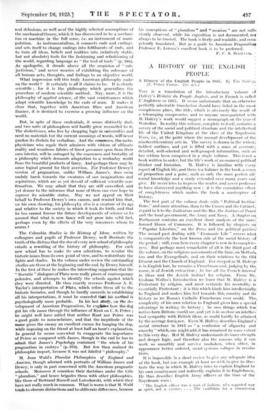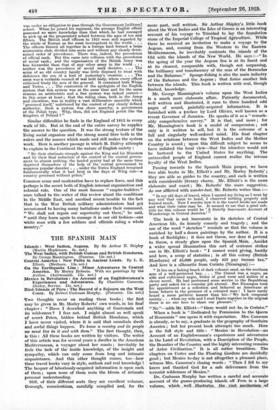A HISTORY OF THE ENGLISH PEOPLE
A History of the English People in 1315. By Elie Halk-y". (T. Fisher Unwin. 25s. nt.t.) A History of the English People in 1315. By Elie Halk-y". (T. Fisher Unwin. 25s. nt.t.) Tins is a translation of the introductory volume of 1-lalevy's Histoirc du Peuple Anglais, and in French is called L'.4ngleterre en 1815. It seems unfortunate that an otherwise perfectly admirable translation should have failed in the most conspicuous place, the title, which is obviously the result of a telescoping compromise, and to anyone unacquainted with M. Halevy's work would suggest a monograph on the year of Waterloo. In reality this volume, complete in itself, contains a survey of the social and political structure and the intellectual life of-the United Kingdom at the close of the NapolconiC Wars, i.e., at the poiht where the normal development of the nineteenth century sets in. The survey is drawn in the widest; boldest outlines, and yet is filled with a mass of accurate; detailed, well-selected and well-grouped information, such as has seldom been comprised in a single volume. This is-not a book written to order, but the life's work of an eminent political thinker and historian. M. Halevy is familiar with every, aspect di English life, and there is a balance in the book, a sense of proportion and a poise, such as only the most perfect all round knowledge and a study extended over many years cart give. He never tries to impress the reader, and never professes to have discovered anything new ; it is the cumulative effect Of completeness which makes the book a masterpiece of history.
The first part of the volume deals with " Political Tnstitu tions," and more attention, than to the Crown and the Cabinet: is paid in it to the Judicature and the Bar, the Justices of Peace and the local government, the Army and Navy. A chapter on. Parliament contains an excellent short analysis of the unre- formed House of Commons. It is followed by chapters on " Popular Liberties," on the Press and the political parties! The second part dealing with " Economic Life " covers what is comparatively the best known side of the social history or the period ; still, even here every chapter is new in its complete- ness: ':But perhaps most-remarkable of all is the third part of the volume, on the religious movements of the time, on Method., ism and the Evangelieals, and on their relations to the Old Dissent and the Church of England. For steeped as M. Halevy: is in English lore, he remains a Frenchman and, judging by the name, is of Jewish extraction ; he has all the French interest* in ideas and the Jewish instinct for religion. From Mr. Graham Wallas's Introduction we learn that M. Halevy is Protestant by religion, and most certainly his mentality is essentially Protestant ; it is this which binds him intellectually; to England and makes him feel towards this country and its history as no Romfeil Catholic Frenchman ever could. The, complexity of his own relation to England gives-him a special, advantage in writing its history ; he sees thinks which few. native-born Britons would see, and yet is in so cloSe an intellec- tual sympathy with British ideas, as could hardly be attained. by the average foreigner. Even M. Halevy describes England's social structure in 1815 as " a confusion of oligarchy and anarchy" which, one might add, it has remained to sonic extent to this very day. But M. Halevy understands its inner strength and deeper logic, and therefore also the reasons why it auf, work so smoothly and survive unshaken, when other, in appearance better ordered, social systems collapse in revolu-
tions.
It is impossible in a short review to give any adequate idea of the book, but one example at least we wish to give to illus- trate the way in which M. Halevy tries to explain England to his own countrymen and indirectly explains it to Englishmen.. He thus describes English Army officers at the time of the Napoleonic wars :
"The English officer was a man of fashion, wEe regarded war as sport, not a n,iencc. . The c.ndidate for a cOmmissiod
was under no obligation to pass through the Government [military] school. When he joined his regiment, the average English officer possessed no more knowledge than that which, he had managed to pick up at the preparatory school between the ages of ten and fifteen. The British staff officers in 1815 were still regarded by the whole of Europe as the most incompetent in the world. . . . The officers thrown all together in a foreign land formed a large aristocratic club, divided into sects and without any clearly deter- mined order of precedence. There was, indeed, the precedence of official rank. But this came into collision with the precedence of social rank ; and the organisation of the British Army was leas hierarchic than that of, any other army in the world . . . neither was the precedence of social rank decisive. . . . The scion of an old country family was little disposed to treat with deference the son of a lord of yesterday's creation. . . . The mein was a veritable Council of war held daily, where every officer criticised freely the acts of the general. It contained both Whigs and Tories. . . . The contention of the apologists of the English system that this system was at the same time and for the same reasons an aristocratic and a free system was indeed correct— in this sense at least ; that the ruling class, both in the Army and elsewhere, was in reality a vast deliberative assembly which ' governed itself,' unfettered by the control of any clearly defined authority. Such a system was sheer, anarchy, a government of the Polish type. Why, then, did not England perish like the kingdOm of Poland ? "
Similar difficulties he finds in the. England of 1815 in every walk of life. But at the end of the entire survey he supplies the answer to the question. It was the strong texture of the living social organism and the strong moral fibre both in the rulers and the masses which made and still makes the system work. Here is another passage in which M. Halevy attempts to explain to the Continent the nature of English society : " By their obstinate struggle against the King and his Ministers and by their final reduction of the control of the central govern- ment to almost nothing, the landed gentry had at the same time deprived themselves of the help of the • central government to suppress popular disorder . . ..under the Tories England remained fundamentally what it had been. in the days of Whig rule—a country governed without police."
Common sense and moderation have to replace force, and this perhaps is the secret both of English internal organization and colonial rule. One of the most famous " empire-builders " once talked to the writer of this review about the conditions 'in the Middle East, and ascribed recent trouble to the fact that in the War British military administrators had got accustomed to having many battalions under their command. " We shall not regain our superiority out there," he said, until they learn again to manage it in our old fashion—one white man with a few soldiers and officials ruling a whole country."



















































 Previous page
Previous page